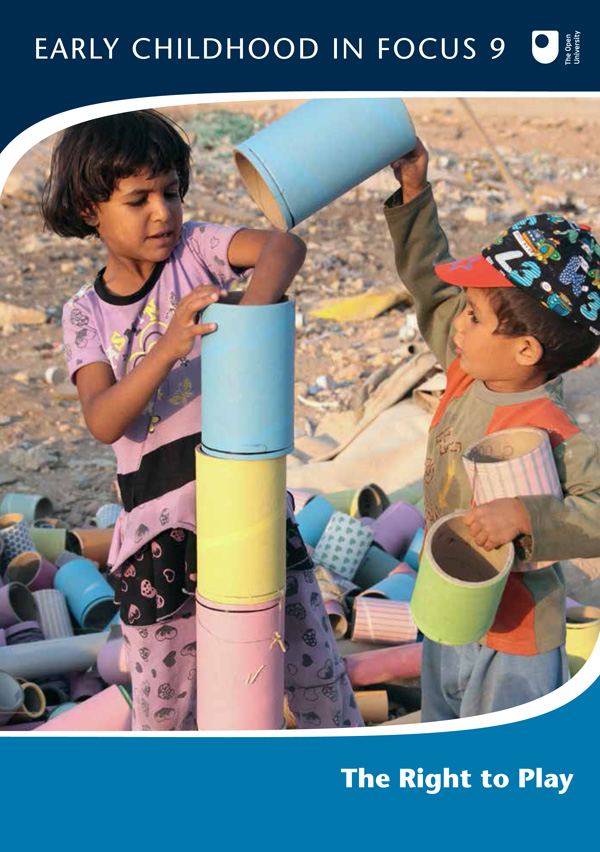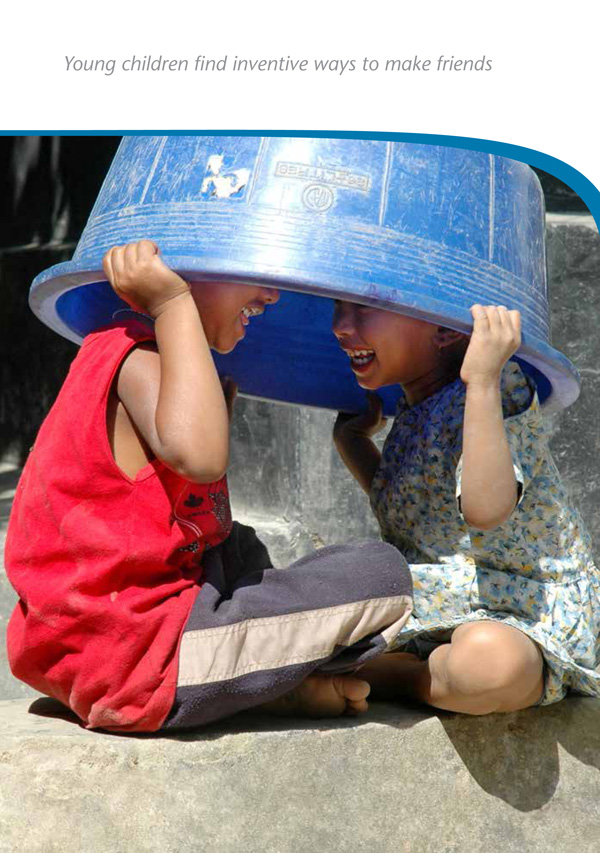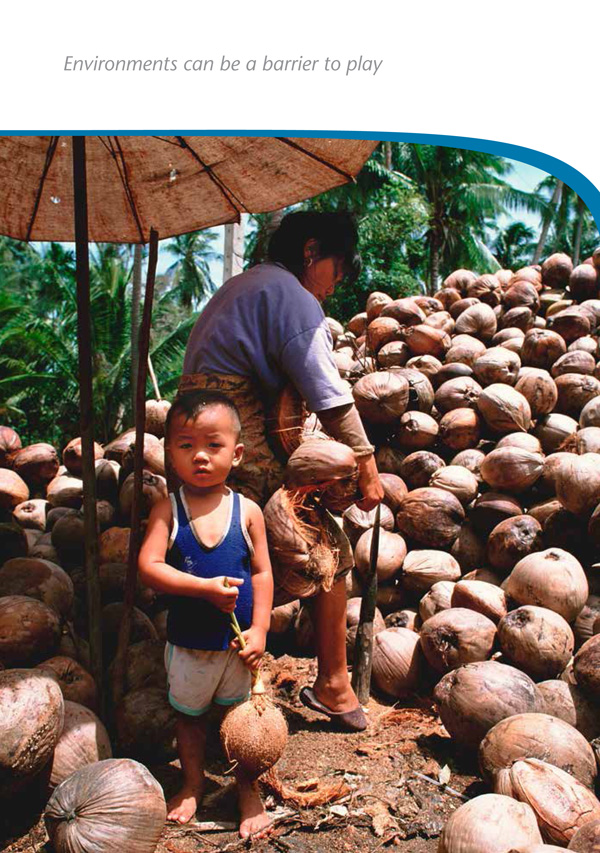The Right to Play: Early Childhood in Focus
 The Right to Play has been published by the Bernard van Leer Foundation to coincide with the UN Committee on the Rights of the Child’s General Comment No. 17, which aims to strengthen implementation of children’s right to rest, leisure, play and recreational activities. (Article 31 of the UN Convention on Children’s Rights).
The editors point out that play has proved an elusive concept to define: “…individuals, communities and governments have such different notions of the value and importance of play for children. Is this distinctive way of behaving understood simply as ‘having fun’? Or does play serve an important function in development, helping children to become sociable and socialised? …Does the idea of adults planning for play run counter to the basic principle that play is self-directed by children?”
The Right to Play has been published by the Bernard van Leer Foundation to coincide with the UN Committee on the Rights of the Child’s General Comment No. 17, which aims to strengthen implementation of children’s right to rest, leisure, play and recreational activities. (Article 31 of the UN Convention on Children’s Rights).
The editors point out that play has proved an elusive concept to define: “…individuals, communities and governments have such different notions of the value and importance of play for children. Is this distinctive way of behaving understood simply as ‘having fun’? Or does play serve an important function in development, helping children to become sociable and socialised? …Does the idea of adults planning for play run counter to the basic principle that play is self-directed by children?”
Research has provided insight into how early infants begin to engage in “playful behaviour, and its crucial function in the infant’s first relationships with parents, siblings and others” along with the depth of cognitive and social understanding “revealed within imaginative play, as children as young as 3 or 4 negotiate complex ‘pretend’ roles and activities.” Unstructured play is increasingly under threat, as global expansion of preschool and primary education introduces formal teaching styles at an earlier and earlier age, growing urbanization leads to pressure on outdoor play spaces, and technological advances tempt children as well as adults to more passive, structured use of leisure time.
After a general introduction to the basic concepts of play, Section II asks the question, “Why does play matter?” with short essays by a number of international experts in the field.
Liz Brooker, Reader in Early Childhood, Institute of Education, University of London, UK speaks to the role of play in development, providing a quick summary of the theoretical understanding developed since the 1950s of the importance of play to the developing child. She stresses that:
- Play has been shown to support many aspects of children’s physical and mental development.
- Many contemporary theories of development through play describe children’s learning as social and interactional, rather than individual.
- Adults and older children support young children in developing and refining their knowledge and understanding of the world.
Linda Harrison, Professor of Early Childhood Education, Charles Sturt University, Bathurst, Australia speaks to the value of playing from birth with mothers and early caregivers, and notes that, “although most research is conducted in Western societies, the formative role of adult caregivers in infant play is also clearly demonstrated by International comparative research (Goncu et al, 2000). She points out that that:
- Face-to-face imitation games build early relationships.
- Babies show a keen interest in their surroundings soon after birth and begin to engage in shared imitative games with parents, siblings and others.
- Adults typically respond to a baby’s interest by imitating their facial expressions and their actions with a toy, which reinforces playful exchanges.
- Parents or other caregivers play a key role in ‘scaffolding’ early play, and encouraging turn taking.

Jennifer Sumslon, Foundation Professor of Early Childhood Education, Charles Sturt University, Bathurst, Australia, discusses playing with peers and siblings, and how young children find inventive ways to make friends, noting that:
- Even very young babies can initiate playful exchanges with other babies, which become increasingly lively and joyful.
- As they become more mobile, young children begin to organise sophisticated games, including negotiating activities and rules.
- Children can be encouraged to express inclusive values through playing fairly and with consideration for others.
- Early peer relationships often centre on objects that one child has, and another child is interested in.
- Recent research studies have paid close attention to the clues which pre-verbal children can give about their intentions, including their wish to establish relationship with others.
Adena Meyers, Professor of Psychology, and Laura Berk, Distinguished Professor of Psychology, Illinois State University, USA talk in their essay about how pretend play supports development, noting:
- Children create imaginative games with everyday materials.
- Pretend play serves important functions in intellectual, social and emotional development.
- Children’s language and story-telling skills are developed as they enact (and negotiate) complex roles and events.
- Children’s capacities for self-regulation, social understanding, joint planning and effective collaboration are practised through pretend play.
Elizabeth Wood, Professor of Education, University of Sheffield, UK , speaks to play and cognitive development, and how active play supports children’s growing understanding:
- Active play with natural and manufactured materials introduces children to key concepts of shape, size, pattern and number.
- With the support of adults, children gradually move from their own working theories of the world to a more scientific or academic understanding.
- Through play children also learn higher-order skills needed for creative thinking, planning and problem solving.
The section ends with a set of policy questions which give excellent starting points for discussion for those collaborating around early childhood development:
- What steps are required to embed understanding about the importance of play in national curriculum guidelines, design for early childhood centres and professional training for all who work with young children?
- How can mothers and other early caregivers be encouraged to understand their crucial role in supporting play from the earliest months, including through parenting courses and more informal sources of support?
- How can the social dimensions of learning through play be protected and fostered in school contexts that increasingly emphasise individual learning achievement?
- Is there a risk that the importance of lay will be underestimated because it is by definition most often ‘playful’, ‘imaginative’ and ‘fun’?
- What further research is needed to fully understand the role of play in children’s cognitive, social and emotional development, including the function of early years play as a foundation for later abstract scientific reasoning?
Access this edition of Early Childhood in Focus.

